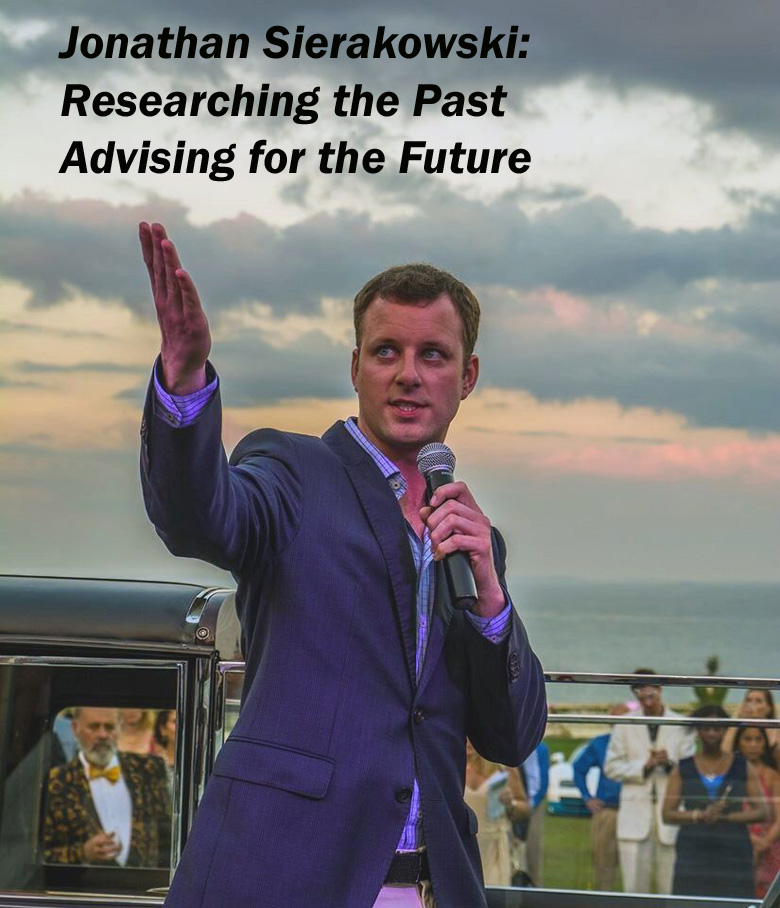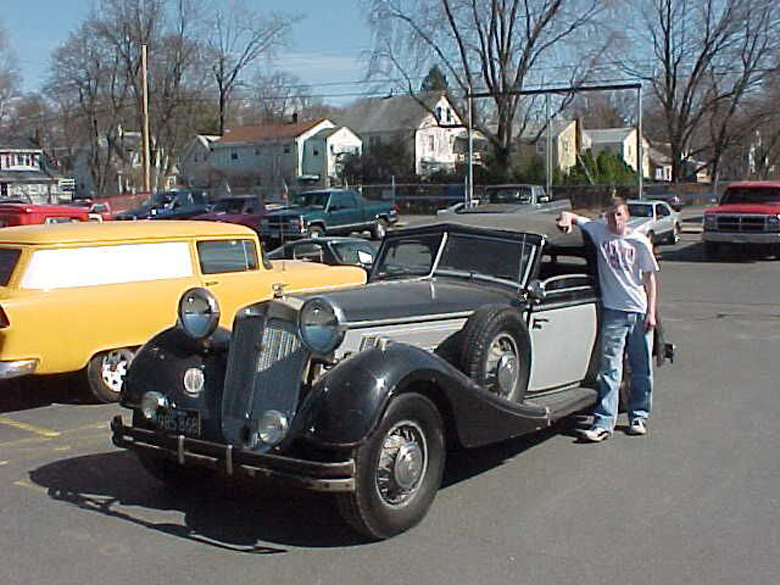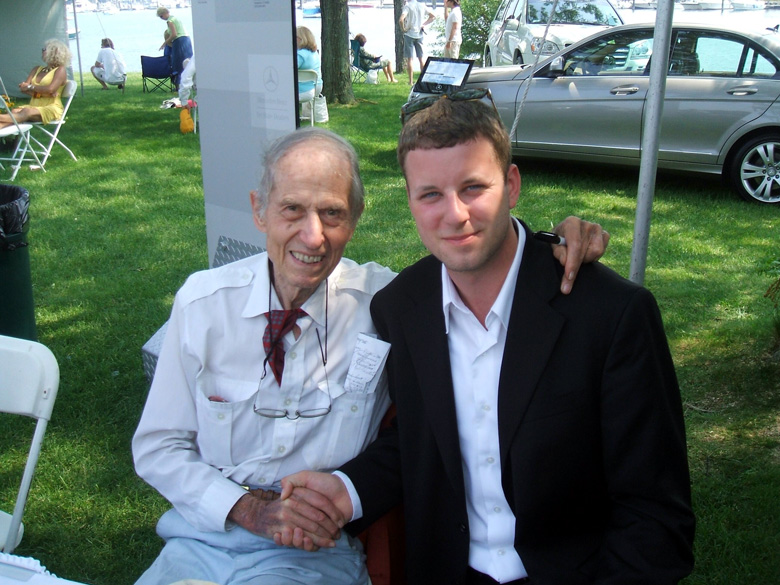Interview by Pete Vack
All photos courtesy Jonathan Sierakowski
Jonathan Sierakowski is a Classic Car Advisor. He provides advice – or as he puts it, “discreet counsel and facilitation” while offering a host of services related to the research, inspection, purchase, sale, and appraisal of classic cars.
That’s something you and I probably did not need in our heyday. Or if we did, we got advice from clubs, friends, mechanics, books, and magazines plus personal experience. But it’s a different era now, and Sierakowski, in his early 30s – is onto something.
Assisting people to part with their money is not new of course; brokers, appraisers, banks, insurance and auction companies have provided at least some consultation and price guides for years. Sierakowski, however, has taken this several steps further, offering services almost from cradle to grave.
Jonathan came up as a topic of conversation when Rick Carey paid a short visit to Williamsburg. Carey had a lot of good things to say about Sierakowski, and I was impressed because Jonathan seemed so young. Young, knowledgeable, enthusiastic, an innovator and entrepreneur. We need more like him if our passion is to continue beyond the Baby Boomer horizon.
We wanted to know more about his business, and more about Jonathan himself. As he writes in his website, “We live in a world contemplating the extinction of the internal combustion engine, yet so many of us have an inextricable passion for motor cars of all ages, and the story behind that passion is always very personal.” So we got personal.
How did you get involved in cars?
When I was twelve, a pair of Horch 853 Cabriolets emerged from a long slumber in my hometown of Manchester, CT. Having been recently acquired by the proprietor of a newly-established restoration facility, my dad took me to see them at Manchester Motor Car Co. I was entranced by their historicity, and that visit sparked the passion. that would become my vocation. A few years later I inquired with the owner, Butch Gordon, about summer work.
I didn’t grow up with collector vehicles in the family. But I received from both of my parents an appreciation for art, architecture, and history- and that set the stage for appreciation of old cars. Two neighbors had old cars that I would occasionally see them on the street. But when I first saw the Horchs I knew they were really different. I had an appreciation for their place in the context of the Second World War, and it resonated with me that they still had the patina from that time, affirming them as witnesses to the era.
You eventually got involved with Manchester Motor Car Co.….
Yes, a summer job sweeping and car dusting gave way to work in the parts department with inventory dating to the 1920s. As I learned how component parts made engines run, my summer job turned into weekday afternoons and weekends, and many summers thereafter. I am forever grateful to Butch for that opportunity. When Butch decided to retire, I was Service Manager by then and helped wind down the work in process and other aspects of the business. That was a tremendous education; for anyone considering entrepreneurial pursuits I can’t advocate enough to pay attention to the educational opportunities you can’t pay for. I still remember Manchester Motor Car Co. very fondly, and Butch and I were very close until his passing in 2014. That was right after I had been involved with the sale of cars from the Malcolm Pray collection. The timing was bittersweet; when I was a teenager I would tell Butch how the shop should be aspiring to do business with the local collectors of the caliber of Mr. Pray, and he ultimately got to see me reach that goal.
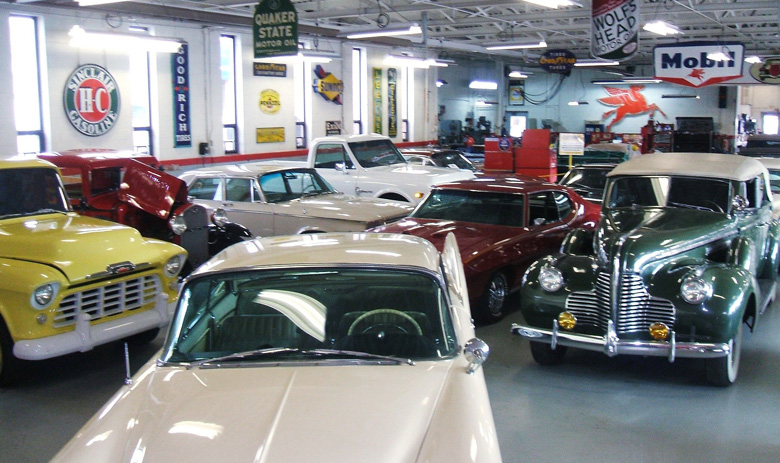
The showroom at Manchester Motor Car Co. The building was a Ford dealership from the 1940s and the memorabilia, collected by Butch over decades, made many guests wax nostalgic.
What about your friends, did they think you odd to work in a restoration shop? Did they enjoy old cars?
Some friends thought it was cool, some thought it was odd, I didn’t care either way. Even clients of the restoration shop thought I was better off pursuing a “real” job and to have cars as a hobby someday. My friends outside of the car world think that traveling the world and touching valuable cars is cool, but they don’t geek out about it, or realize I’m sometimes working seven days a week. All the younger people I know that are really into cars are in the trade, but it’s good to see that there is a growing rank of the next generation. I believe that people will always want to own collector cars of every era, although the market will of course naturally ebb and flow. At the end of the day I feel fortunate to have a passion as my vocation and to have had so many mentors along the way.
How else did this new passion manifest itself? Did you consider taking engineering courses?
I actually considered not going to college- I thought the parts & rebuilding division of Manchester Motor Car Co. could have been built into a bigger business. My parents put the kibosh on that. So I decided to apply to the University of Connecticut School of Business to get a degree in Management with a concentration in Entrepreneurship. I figured that some basic business education would complement my pursuit, and it has. I also worked at the student newspaper at UConn, I worked in the advertising department which gave some more practical experience and then I was the Editor-in-Chief. That crash course in journalism has benefitted me greatly.
What was your first car? Did you work on it? Did the shop help you?
My first car was a 1991 Toyota Camry; I don’t ever see myself waxing nostalgic and finding one to restore. My first collector car was a 1973 Triumph TR6. I did some of the work on it like brakes, tune-ups, head gasket etc. with help from guys in the shop. It was a good hands-on education. When it ran, it was a lot of fun, and I had it for about eight years.

My TR6 parked on the street outside of my parents’ house. In the foreground is my 100,000-mile BMW 740iL. This was my second daily driver after the motor in my Toyota went. I had it only 6 months then decided to put a new motor in the Toyota. Can anyone guess why?
You worked for RM from 2012 to Jan 2017. What was it like, what did you learn, why did you leave?
Thanks to Rick Carey, I got to travel to all of the big auctions, and he educated me a great deal and introduced me to the people that managed the catalogs. A year of freelance for most of the auction houses gave way to a full-time role at RM Auctions which rapidly evolved and presented many exciting opportunities.
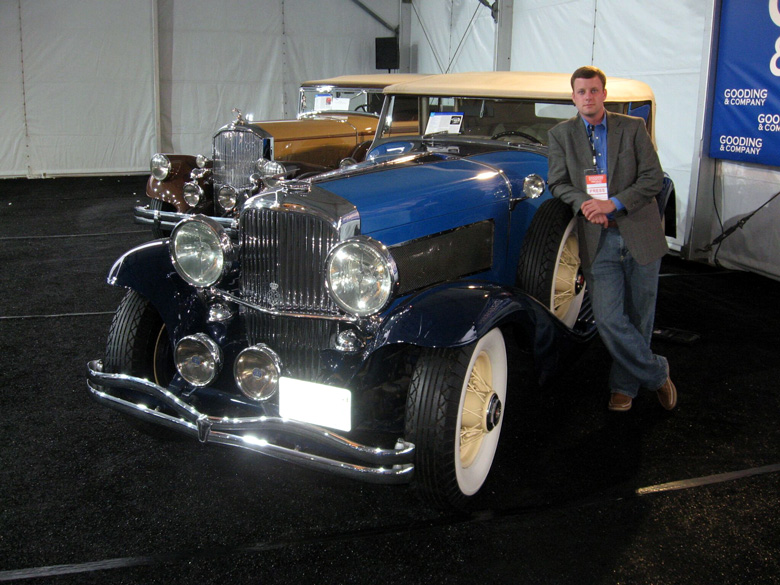
Please don’t touch! Taking a moment to relish my exposure to the high-end world of collector cars thanks to Rick Carey.
The company was going by leaps and bounds, the market was moving up, the partnership with Sotheby’s was created. I feel fortunate to have been there during that period, having gotten exposed to and been able to touch many of the great cars that were being sold and restored. I got involved with researching cars going through restoration and had a lot of fun being involved with the guys in the shop- and learned how powerful information could be in influencing a myriad of decision points, and even the outcome on the show field.
There was a confluence of factors in 2016 that made me realize it was time to make a change. RM lost a beloved colleague a month before I got engaged, and I lost my mom a month after. Talk about a time of reflection on what you want to make of gift of life.
Elizabeth and I had a new chapter to start and we knew it wasn’t going to be in southern Ontario, which made the logistics a bit challenging. I tried to be thoughtful about different options and ultimately confided in a friend that I was thinking of going on my own. He responded “You kidding me? You have no debt, no mortgage, no kids… if there is ever a time to take a shot on your own this is it!”
Motivated to work closely with the coachbuilt automobiles I always gravitated to, I founded Sierakowski Classic Car Advisors in January 2017. Making the leap was surreal, but it was the right choice. I still count many folks at RM as close friends, and we still help and cheer each other on.
On top of starting a new business, you moved from New England to Raleigh last year.
My wife and I decided that staying on the East Coast but getting away from the cold winters was a priority. Most people don’t have the opportunity to go anywhere they want, but this is keeping in mind that I had been living in Canada the last five years and Elizabeth was working as a traveling doctor and spending downtime with me in Ontario, so we were not committed to be anywhere. New England was just a stopover while we charted our course, and our wedding was taking place there also. As we looked at different areas, Raleigh pinged us several times, and ultimately Elizabeth got a great job opportunity that sealed the deal.
This is turning out to be a great place to live, and as a bonus I’m 20 minutes from the airport. Needless to say 2017 was a big year of transition –we even managed to close on a home just before Christmas!
Where do you go from here?
Strategically, I will always be committed to focus on building relationships first, and trust that business in its various forms will flow from there, it’s already happened that way. Organizationally, I’ve been putting a lot of thought into growing beyond myself, likely more with trusted partners than employees. I don’t make rash decisions and have been taking time to look at friend’s businesses to identify what aspects I want to emulate and identify those I don’t. In the next year or so I’ll start looking for a private office/workshop/storage space. I envision this being a private space to show a car rather than a storefront as I am not pursuing that kind of volume, but all plans are flexible as we continue to evolve with the environment.
Next week, Part 2. We look at the service he offers and ask the hard questions…
